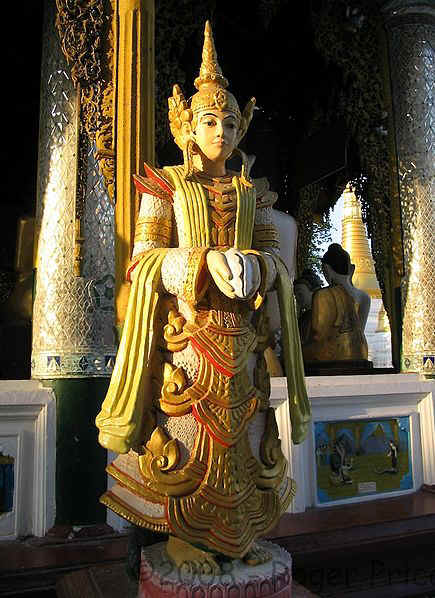Indra
is the King of the gods or Devas and Lord of Heaven or Svargaloka in Hindu
mythology. He is also the God of War, Storms, and Rainfall.
Indra
figures as one of the chief deities in the Rigveda, celebrated as the slayer of
Vŗtra and
central to the Soma sacrifice. He has many epithets, notably vŗşan the
bull, and vŗtrahan, slayer of Vŗtra. Indra appears as the name of an
arch-demon in the Zoroastrian religion, while Verethragna appears as a god of
victory.
In
Puranic mythology, Indra is bestowed with a heroic and almost brash and amorous
character at times, even as his reputation and role diminished in later Hinduism
with the rise of the Trimurti. In Buddhist tradition, Indra is also called
Śakra (Pali: Sakka). He is known in Burmese as Thagyamin, in Thai as
พระอินทร์ Phra Intra, in
Malay as Indera, in Tamil as Intiran, in Chinese as 帝释天
Děshětiān, and in Japanese as 帝釈天
Taishakuten.
Indra
is, with Varuna and Mitra, one of the Ādityas, the chief gods of the
Rigveda (besides Agni and the Ashvins). He delights in drinking Soma, and the
central Vedic myth is his heroic defeat of Vṛtrá, liberating the rivers,
or alternatively, his smashing of the Vala, a stone enclosure where the Panis
had imprisoned the cows, and Ushas (dawn).

A
Burmese statue of Thagyamin, who is the Burmese
representation of Indra
The
Rig-Veda frequently refers to Indra as Śakra: the mighty-one. In the Vedic
period, the number of gods was assumed to be thirty-three and Indra was their
lord. (The slightly later Brihad-aranyaka Upanishad enumerates the gods as the
eight Vasus, the eleven Rudras, the twelve Adityas, Indra, and Prajapati). As
lord of the Vasus, Indra was also referred to as Vāsava.
By
the age of the Vedanta, Indra became the prototype for all lords and thus a king
could be called Mānavendra (Indra or lord of men) and Rama, the hero of the
Ramayana, was referred to as Rāghavendra (Indra of the clan of Raghu).
Hence the original Indra was also referred to as Devendra (Indra of the Devas).
However, Sakra and Vasava were used exclusively for the original Indra. Though
modern texts usually adhere to the name Indra, the traditional Hindu texts (the
Vedas, epics and Puranas) use Indra, Sakra and Vasava interchangeably and with
the same frequency.
He is married to Indrani (whose father, Puloman, Indra killed), and is the father of Arjuna, Jayanta, Midhusa, Nilambara, Khamla, Rbhus, Rsabha. He is attended to by the Maruts (and the Vasus), children of Diti (mother of demons), and Rudra. Indra had slain Diti’s previous wicked children, so she hoped her son would be more powerful than him and kept herself pregnant for a century, practicing magic to aid her fetal son. When Indra discovered this, he threw a thunderbolt at her and shattered the fetus into 7 or 49 parts; each part regenerated into a complete individual, and the parts grew into the Maruts, a group of storm gods, who are less powerful than Indra.